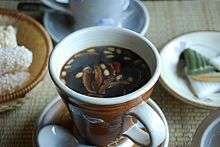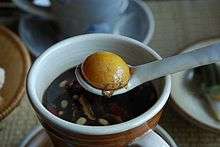Ssanghwa-tang
Ssanghwa-tang (쌍화탕; 雙和湯) or ssanghwa-cha (쌍화차; 雙和茶) is a traditional Korean tea with deep brown colour and a slightly bitter taste. Along with sipjeondaebotang, it is one of the most popular types of medical tea in Korea.[1]
  Ssanghwa-tang with an egg yolk | |
| Type | Traditional Korean tea |
|---|---|
| Country of origin | Korea |
| Colour | Deep brown |
| Flavour | Slightly bitter |
| Ingredients | White woodland peony root, Rehmannia root, Mongolian milkvetch root, Korean angelica root, lovage root, Chinese cinnamon bark, Chinese liquorice |
| Korean name | |
| Hangul | 쌍화탕 |
|---|---|
| Hanja | 雙和湯 |
| Revised Romanization | ssanghwa-tang |
| McCune–Reischauer | ssanghwa-t'ang |
| IPA | [s͈aŋ.ɦwa.tʰaŋ] |
| Hangul | 쌍화차 |
| Hanja | 雙和茶 |
| Revised Romanization | ssanghwa-cha |
| McCune–Reischauer | ssanghwa-ch'a |
| IPA | [s͈aŋ.ɦwa.tɕʰa] |
It is made by boiling down a number of medical herbs such as dried roots of white woodland peony (백작약; 白芍藥; baekjagyak), steamed and dried roots of rehmannia (숙지황; 熟地黃; sukjihwang), dried roots of Mongolian milkvetch (황기; 黃芪; hwanggi), dried roots of Korean angelica (당귀; 當歸; danggwi), dried roots of lovage (천궁; 川芎; cheongung), Chinese cinnamon barks (계피; 桂皮; gyepi), and Chinese liquorice (감초; 甘草; gamcho). However, many people today buy the tea pre-made.[2]
Efficacy and administration methods
Ssanghwangtang is a herbal bath which was enjoyed in the morning and evening during the Joseon Dynasty. Precautions for use should be consulted with a doctor, pharmacist, etc. before taking it, such as patients with hypertension, heart failure or kidney disorder, edema patients, and patients receiving medical treatment.[3]
See also
- Traditional Korean tea
- Traditional Korean medicine
References
- "The Health Benefits of Traditional Korean Tea". The Chosun Ilbo. 21 February 2015. Retrieved 2 February 2017.
- "The World of Korean Tea – Medicinal Tea". Korea Tourism Organization. Retrieved 2 February 2017.
- "Considering your health, Ssanghwa-tang". 문화·산업·경제강국을 향한 [문화저널21]. 2018-01-11. Retrieved 2018-04-17.